Engaged Anthropology Grant: Ather Zia
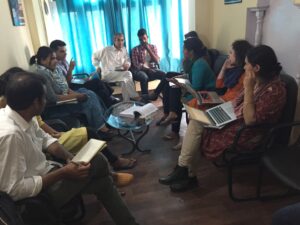
Ather Zia is an Assistant Professor of Anthropology at the Center for Asian Studies, University of Colorado, Boulder. In 2011 while a doctoral student at the University of California, Irvine, she received a Dissertation Fieldwork Grant to aid research on “Politics of Absence: Women Searching for the Disappeared in Kashmir,” supervised by Dr. Victoria Bernal. In 2016 Dr. Zia received an Engaged Anthropology Grant to aid engaged activities on “Exploring Strategies for a Stronger Association of Parents of Disappeared Persons in Kashmir”.
This project, building on the findings of my previous study worked on how the women-led Association of Parents of the Disappeared Persons popularly called the APDP[1] in Kashmir could overcome three challenges that pose a threat to its goals and long-term sustainability. In Kashmir, since the armed movement broke out in 1989, India has deployed massive number of armed troops. In the lethal counter-insurgency laws measures implemented by India, human rights groups claim that over 70,000 people have been killed and more than 8000 men have been forcibly disappeared in custody by the Indian army. The APDP member-activists are mainly Muslim women, including mothers and wives (called half-widows) of the disappeared men who have become tireless human rights activists, an unprecedented engagement in a conservative Muslim-dominated society. The APDP activists mobilize demonstrations, pursue court cases and collect documentation.
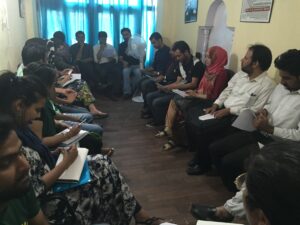
On one hand the APDP has become an internationally visible movement, but on the other hand it faces three challenges that threaten its effective working towards searching for the disappeared men; 1) the legal cases pertaining to the disappeared persons filed in courts against the army and the state by the APDP activists are languishing in courts without results, 2) APDP suffers lack of funding to support its day to day activities which includes documentation, legal proceedings, creating public awareness and even salaries for the member staff [who are trained human rights activists) 3) In case of half-widow-activists, there is lack of awareness about the duration they have to wait before they can remarry. While not a direct challenge to APDP as a movement, the half-widows need support because having lost husbands who were their primary breadwinners, these women have also lost financial means and social status.
Within the purview of the engaged anthropology project as proposed I conducted a series of workshops with various sections of the host community and external resource persons to understand the breadth of the aforementioned issues and interrogate strategies through which the APDP as a organization can be made more robust and create support for its members. These workshops provided a chance to generate a dialogue between the members and other participants for creating successful legal strategies, raising funds, and supporting the organization in most crucial aspects.
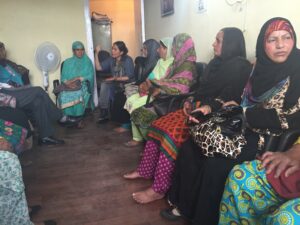
This engagement project aimed 1) To enable a dialogue between the APDP members and legal practitioners, scholars and activists to explore strategies for making legal procedures for enforced disappearance cases yield maximum results; (2) To generate a conversation amidst APDP members about their challenges and struggles of emotional, legal and financia nature, (3) To enable a dialogue between APDP member-activists, professional HR activists and potential donors towards exploring the possibilities for fundraising, (4) To enable a dialogue between the APDP members and religious scholars to address the issue of re-marriage for half-widows; its religious and social consequences and creating awareness.
The participants in the workshops included those that have previously and/or are currently involved with APDP, such as, mothers, half-widows and other kin-activists; APDP administrative staffers and internees; Lawyers, judicial officials, and legal activists; Religious scholars and social activists.
Workshop 1: Legal Workshop – Rethinking, and Strategizing Human Rights Cases
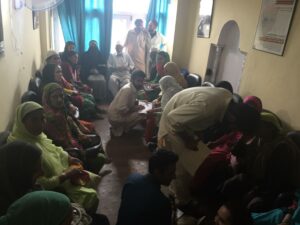
This workshop proved to be a significant milestone in rethinking and strategizing APDP’s legal struggles. The Wenner Gren Engaged anthropology project was pivotal in generating a legal network; gathering relevant participants, and creating discussion.
Workshop 2 & 3: Sustaining solidarity and the Future of APDP
The conversation between the activists was cathartic and eye opening. This meeting opened floodgates of emotion and concerns by asking the members “now what from here on?” The activists shared their concerns and challenges both concerning their private and public activism. The discussion included talking about topics: like sustaining solidarity; reinforcing the APDP efforts; funding for APDP; help for families; half-widows; engaging the next generation with APDP and future challenges. A few initiatives were discussed aiming at alleviating some financial challenges of the activists and the organization.
Workshop 4: Future of Half-widows: Remarriage or Property Rights?

One of the most important findings of this workshop was that remarriage is not a priority for the half-widows but in the last 30 years acquiring property rights has emerged as a their primary concern. Concerning remarriage as per the Indian law, half-widows are not recognized as widows until seven years after the disappearance; in the interim, a half-widow cannot remarry or qualify for any government welfare plans. To counter the rising social problems of half-widows, Islamic scholars in Kashmir have shortened the duration of time until remarriage to four years. The time duration, either four or seven years, implies the possibility of return, and the men are technically considered not dead. Most half-widow-activists maintained a strong hope that their husbands will return and have not remarried. This is supported by a survey of half-widows, which records that about 91% of the half-widows refused to remarry. Most participants in the workshop agreed that attaining property rights was where they required support. The JKCCS/APDP in collaboration with designated lawyers and Islamic scholars plans to devise legal and religious strategies to solve the property rights issues of the hal-widows.
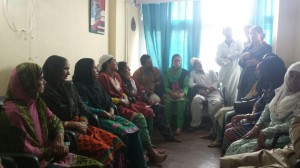
Fieldwork Highlights
Guest contributor for ASAP – Association for the Anthropology of Policy
The PI was invited to be a Guest Contributor from the field and post to the instagram website of Association for the Anthropology of Policy (ASAP). The PI has tweeted all the postings to the Wenner Gren twitter account, which was duly acknowledged. The postings with images are available on the link provided. Please see from Kashmir Post 1 through 15.
[1] This project was specifically conducted with APDP (Jammu Kashmir Coalition of Civil Society). A similar project is planned in future with my other host community APDP (headed by Parveen Ahangar).